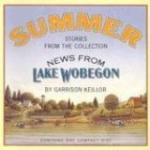“During the evenings, he would gather us about him, and illustrate some mathematical problem, or, giving us a dissertation upon natural science, would expound the laws of gravitation, etc.
“In the daytime, when not fishing or bee hunting, he would work in the fields with father and brother Barnes. There was excellent trout fishing, I remember, in the brooks; and that, with bee hunting and watching the forest fires, was his only amusement; for shooting was a pastime in which he never indulged.”
“I thought,” said Marguerite, “that boys in the country were always fond of shooting.”
“As a rule they are,” replied mamma; “but your uncle was not. His delicate, sensitive nature was always shocked by the sharp report of a gun. I remember that when we were in Vermont he and brother Barnes would go out together to hunt squirrels, Barnes carrying the gun; and that when the game was found, brother Horace would cover his ears with his hands, to soften the noise of the discharge.
“I suppose, my dears, that you do not know how hunters find wild honey?”
We knew little of wild honey save that John the Baptist used to eat it, so mamma continued:
“The bees, having no hives provided for them, made their honey in the hollow trunks of trees; and as it was one of the luxuries of our table, it was quite important to trace out their hiding-places. Brother Barnes would go out with a little box of syrup or honey, and when he found a bee upon a flower would imprison it in the box, detaining it there until it had had time to load itself with sweetness. When it was released, it would make a ‘bee line’ for its home in the tree; never pausing by the way, even for the sweetest flowers. Barnes would note the direction it had taken, and follow it as well as he could; but often he would be obliged to capture several bees, and sometimes pass days in the pursuit, before he would be rewarded by hearing in some tree a buzzing that could almost be called roaring. The next step was to fell the tree, which would cause the bees to quickly disperse; not, however, without stinging the intruder; but the result compensated for a sting or two, for it was not unusual for Barnes to find from twenty to thirty pounds in a tree, often, however, so mixed with the soft wood that we were obliged to strain it before it was fit to put upon the table.”
“You spoke of the forest fires, mamma,” said Marguerite; “pray, what were they? The woods were never literally on fire, I suppose.”
“Oh yes,” replied mamma, “and the fire often lasted a long time. One means of clearing the ground to make a farm was to fell the trees, while in full leafage, in what were called ‘winrows.’ They lay in great piles for a year and sometimes longer; then when quite dry they would be ignited, and a glorious bonfire on a gigantic scale would ensue. The fire would burn up not only all the logs and dead leaves upon the




